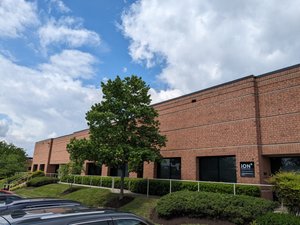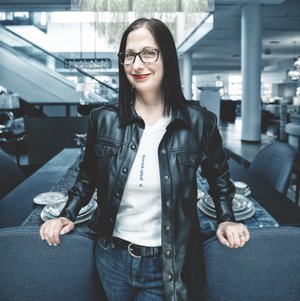![111109-Roxbury-0941[1]](https://media.bizj.us/view/img/11801395/111109-roxbury-09411*540xx928-522-70-0.jpg)
This time last year, Michelle Brown was just moving out of 1776 and into her new Eastern Market office space. The former teacher had landed a $3.9 million grant the month before from the U.S. Department of Education for her then two-year-old nonprofit startup, CommonLit.
Now, Brown says the company hit its 1 millionth registered user in 11 months, the same amount of time it took Facebook to land its 1 millionth user. And today, CommonLit is gaining 20,000 users daily, and they have 100,000 daily active users.
CommonLit provides free reading resources for teachers and their students. According to a study conducted by the Department of Education and National Institute of Literacy, 19 percent of high school graduates can't read. To solve this, CommonLit provides a variety of free online tools for grades 5-12.
Most of the user growth, Brown said, has been through word-of-mouth.
"If you look at our analytics about how we're spreading, the vast majority of the teachers who come to our site and register are coming direct," Brown said. "Teachers are literally walking down the hall and telling other teachers about this cool thing that we built."
According to CommonLit's 2016-2017 Impact Report, over 30 percent of American public middle and high schools now rely on CommonLit. Seventy-three percent of those users are from Title I schools, a designation given to schools with high concentrations of low-income students. Most of the schools they serve have multiple teachers registered on the platform.
The nonprofit has also seen some significant growth abroad, with the top five countries using CommonLit being Canada, Australia, the United Kingdom, China and Afghanistan.
"Because we have a free website that anyone can access, we're starting to notice that it's being picked up all over the world," Brown said. "So our vision would be in the next 3-to-5 years to be to learn more about those markets and the vulnerable children in those communities."
Brown started CommonLit after starting her first teaching job in a high-poverty Mississippi school through Teach for America. She had zero books and no teaching materials. Each night for the next two years, she spent nights and weekend building a reading curriculum from scratch for her students with varying reading levels between them. Her Teach for America experience is what helped her open her eyes to the resource disparity between urban and rural school districts. CommonLit was born while Brown was working on her master's degree in Education Policy at Harvard in January 2014.
CommonLit, despite its startup-esque growth, is still a nonprofit. Government grants provide 85 percent of the group's funding, with foundation, corporate and individual donations filling the gap.
"My role is always evolving as the company needs it to evolve."
That probably explains why Brown's job as CEO is a bit different than your typical startup executive. She views it in three ways: the key fundraiser, talent recruiter and visionary.
"I've had to learn that my role is always evolving as the company needs it to evolve," she said. "For example, I am not a machine learning specialist. But now that we have a dataset with 37 million rows, we have to look at that, and I have to imagine what is possible in the future. I'm finding that I'm having to learn a lot and bring in experts who can take that vision and run with it."
It's not easy being the head of a company that's changing so quickly. The Department of Education grant allowed CommonLit to build out their technology platform further, move into their Eastern Market office space and build out the curriculum and engineering teams further. In the last year, CommonLit has grown from three full-time employees to 17 team members, with plans to hire more.
"Team culture became a huge deal for CommonLit. It was something that had to get worse before it got better," Brown said. "We're now way stronger for it. But it was certainly just with fast growth comes a lot of challenges."
CommonLit was adding so many new and necessary teams and skillsets to the company, and Brown is a non-technical founder. Communication barriers went up pretty quickly as the company expanded. Building up and working with an engineering team was something Brown had to learn.
"Because I empathize so much with our end user, that's a big reason why I think we've built a great product, but the challenge of that is that I've never led an engineering team and I've never grown one from scratch," Brown said. "I had to rely a lot on mentors and advisors and our own internal team to tell me what they need."
“It’s like drinking from a fire hose every morning."
With fast growth comes a plethora of ideas, naturally. Brown said they're eyeing their international growth and exploring ways to mobilize on that. CommonLit has also been tracking how often teachers have been using hardware, like Chromebooks, in classes. A lot of the demand they're seeing from teachers is for more educator-focused digital training tools.
"I haven't gotten it right every time, but what my team has needed from me is to make decisions," Brown said. "I have good intuition and I test my assumptions, and I think they respect the decisions that I make, especially when I show them my rationale."
Brown devours management books, and her team recently read "Radical Candor" by Kim Scott together as a bonding activity. It's one of the ways Brown has found to manage the fast growing company.
"It's like drinking from a fire hose every morning," Brown said.
"Our context is changing so fast, and now that we're the hot edtech startup and we're getting a lot of inbounds where entire school districts are adopting us, we have all sorts of partnership opportunities. My challenge is to keep everyone focused on making the main thing, the main thing."







